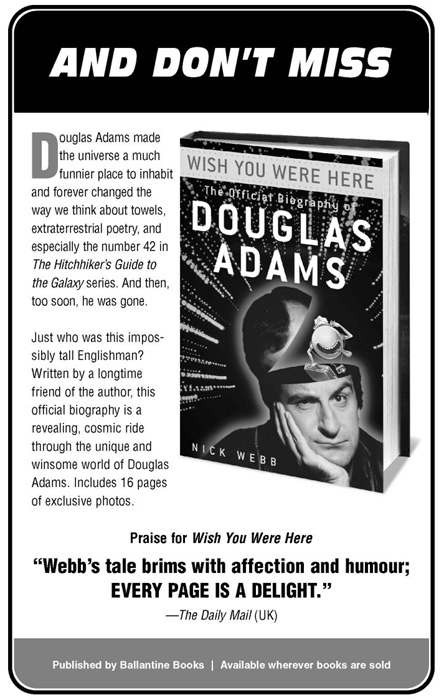The Hitchhiker's Guide to the Galaxy (24 page)

So I stayed home and adapted
Charlotte’s Web.
But I have a contact in England who’s shipping me bootlegged copies of EastEnders.
How did it feel when those actors wanted to change
your lines?
Alfred Hitchcock once said that actors are like cattle. To me, actors are more like the North American woodchuck. Perky, excellent climbers, good teeth. They’re also quite good with dialogue (I’m talking actors now, not woodchucks), so when an actor suggests a line change, I welcome it with open arms. Unless, of course, the line sucks.
None of these actors suggested sucky line changes. Sam Rockwell seemed to want to add “all right” to every second line. And not as a question, more as a sort of nervous addendum. Example: “Let’s go to Magrathea. All right.” “Hit that drive button. All right.” Sort of an Elvis additive. And that worked out . . . all right. Martin Freeman kept saying, “You know, if Ricky Gervaise were here, he’d write the line like this”—and that just wasn’t necessary. So I told him Tim in the American version would probably be better than him. Mos kept wanting things to be more “poetic.” Curse you, Russel Simmons! Zooey told me I was really in touch with my feminine side and ever since I’ve been watching more football and have sold all my Bette Midler CDs.
OK, honestly—the script got better the two weeks we worked on it together. They’re a great cast and they were all very collaborative. I hated that I had to leave.
How many hours of rewrites did you have to do?
Not many. The read-through revealed the script to be in pretty good shape. Most rewrites were done on the spot while we were working the various scenes.
I did do one fun exercise. For all of the scenes between Arthur and Trillian, I wrote two different versions. In one I replaced the dialogue with the subtext dialogue. In another, I wrote (in dialogue form) exactly what the characters were thinking, which they spoke out loud before delivering their actual lines. It actually turned out to be very helpful.
Isn’t that fascinating? I think it’s absolutely riveting. I asked Garth and Nick to include that on the DVD. Their response? “Hmm. Let us get back to you on that.” So I wrote out the subtext of their response and here it is.
“Dream on, wanker.”
So, how’s it looking now?
I think—and I say this with all humility—that it may very well be one of the best films ever created. It is beautifully shot, masterfully directed and exquisitely acted.
Then again, I haven’t actually seen it so I might not be the best person to ask.
For more information on the
Hitchhiker’s Guide to the Galaxy
movie, please visit
www.hitchhikersmovie.com
.
For more information on Douglas Adams and his creations, please visit
www.douglasadams.com
, the official website.
You may wish to join ZZ9 Plural Z Alpha, the official Hitch
hiker’s Guide to the Galaxy
Appreciation Society. For details, please visit
www.zz9.org
.
Douglas Adams was a patron of the following two charities: The Dian Fossey Gorilla Fund (
www.gorillas.org
) and Save the Rhino International (
www.savetherhino.org
).
1
The term
Imperial
is kept though it is now an anachronism. The hereditary Emperor is nearly dead and has been for many centuries. In the last moments of his dying coma he was locked in a stasis field which keeps him in a state of perpetual unchangingness. All his heirs are now long dead, and this means that without any drastic political upheaval, power has simply and effectively moved a rung or two down the ladder, and is now seen to be vested in a body that used to act simply as advisers to the Emperor—an elected governmental assembly headed by a President elected by that assembly. In fact it vests in no such place.
The President in particular is very much a figurehead—he wields no real power whatsoever. He is apparently chosen by the government, but the qualities he is required to display are not those of leadership but those of finely judged outrage. For this reason the President is always a controversial choice, always an infuriating but fascinating character. His job is not to wield power but to draw attention away from it. On those criteria Zaphod Beeblebrox is one of the most successful Presidents the Galaxy has ever had—he has already spent two of his ten presidential years in prison for fraud. Very very few people realize that the President and the Government have virtually no power at all, and of these few people only six know whence ultimate political power is wielded. Most of the others secretly believe that the ultimate decision-making process is handled by a computer. They couldn’t be more wrong.
2
Because Ford never learned to say his original name, his father eventually died of shame, which is still a terminal disease in some parts of the Galaxy. The other kids at school nicknamed him Ix, which in the language of Betelgeuse Five translates as “boy who is not able satisfactorily to explain what a Hrung is, nor why it should choose to collapse on Betelgeuse Seven.”
3
The Digital Village was designed as a multiple-media company and produced the
Starship Titanic
computer game and the h2g2.com website based on the
Guide
itself. The founders were Douglas, me, Richard Creasey (a senior TV executive), Ian Charles Stewart (an investment banker), Mary Glanville (also a TV executive), Richard Harris (a technical expert) and Ed Victor.
4
When the film finally came to be made, Jon Glickman and Derek Evans from Spyglass were producer and executive producer respectively.
5
The Salmon of Doubt
—a collection of Douglas’s writings and the beginning of the last novel he was working on before he died, which would have been the third Dirk Gently book.
6
Do not assume that is the budget for the
Hitchhiker’s
movie!
7
Stand-ins replace the stars on set while the director of photography and director light up the next set and rehearse camera moves.
8
Garth and Nick of Hammer and Tongs, and Dominic Leung, second unit director and the third founding partner.
9
Simon Jones played Arthur Dent in the original radio and television series.
10
Zooey Deschanel, who plays Tricia McMillan.
11
Sam Rockwell, who plays Zaphod Beeblebrox and Mos Def, who plays Ford Prefect.
12
Sammy Sheldon, costume designer.
13
Gina Bellman.
14
British actors call this the “read through”—the first time the whole cast gets together to simply read the script.
15
Jason Schwartzman, who plays Gag Halfrunt.
16
The Hitchhiker’s Guide to the Galaxy: The Original Radio Scripts
(Pan Books, 1985 and 2003).


About the Author
Douglas Adams was born in 1952 and created all the various and contradictory manifestations of
The Hitchhiker’s Guide to the
Galaxy:
radio, novels, TV, computer game, stage adaptations, comic book and bath towel. He lectured and broadcast around the world and was a patron of the Dian Fossey Gorilla Fund and Save the Rhino International. Douglas Adams was born in Cambridge, UK and lived with his wife and daughter in Islington, London, before moving to Santa Barbara, California, where he died suddenly in 2001. After Douglas died, the movie of
Hitchhiker
moved out of development hell into the clear uplands of production, using much of Douglas’s original script and ideas. Douglas shares the writing credit for the movie with Karey Kirkpatrick.
BY DOUGLAS ADAMS:
Published by The Random House Publishing Group
The Hitchhiker’s Guide to the Galaxy
The Restaurant at the End of the Universe
Life, the Universe and Everything
So Long, and Thanks for All the Fish
Mostly Harmless
The Ultimate Hitchhiker’s Guide to the Galaxy
The Salmon of Doubt
Dirk Gently’s Holistic Detective Agency
The Long Tea-Time of the Soul
The Original Hitchhiker Radio Scripts
The Meaning of Li f (with John Lloyd)
Last Chance to See (with Mark Cowardine)
The Deeper Meaning of Li f (with John Lloyd)
The Hitchhiker’s Guide to the Galaxy
is a work of
fiction. Names,
characters, places, and incidents are the products of the author’s imagination
or are used fictitiously. Any resemblance to actual events, locales, or
persons, living or dead, is entirely coincidental.
2005 Del Rey® Books Trade Paperback Edition
Copyright © 1979 by Serious Productions Ltd.
Afterword © 2004 by Robbie Stamp
All rights reserved.
Published in the United States by Del Rey® Books, an imprint of The
Random House Publishing Group, a division of Random House, Inc.,
New York.
Del Rey is a registered trademark and the Del Rey colophon is a trade-
mark of Random House, Inc.
Originally published in the United States by Harmony Books, a division
of Crown Publishers, Inc., in 1980.
Grateful acknowledgment is made to Williamson Music for permission to
reprint lyrics on pp. 116–117 from “You’ll Never Walk Alone” by
Richard Rogers and Oscar Hammerstein II. Copyright © 1945 by
Williamson Music. Copyright renewed. International Copyright Secured.
Used by permission.
All Rights Reserved.
eISBN: 978-0-307-41713-8
v3.0
